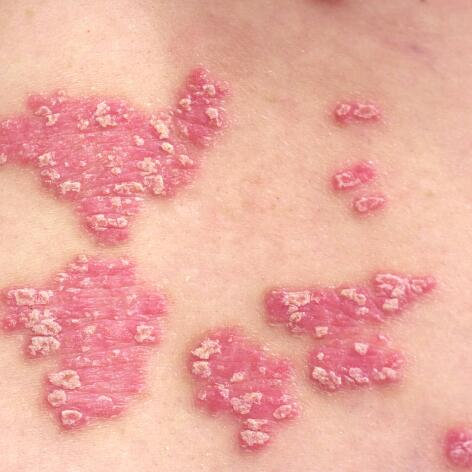Sun and psoriasis
Sun and psoriasis
The sun is good for your mood. And it's also good for most people with psoriasis, but only if you take a few precautions. Here are the keys to getting the most out of the sun.

Psoriasis: when the sun reduces symptoms
Thick patches on the skin that are red and scaly due to the accumulation of dead skin: this is the most common manifestation of psoriasis, a chronic skin disease.
The good news is that for the vast majority of people with psoriasis, the appearance of the lesions improves with sunlight. UV rays reduce the inflammation of the skin and minimise the appearance of the plaques. However, sun exposure must be gradual and moderate. The usual protective measures should be adopted: sun cream, hat, exposure at the least hot hours, etc.
Psoriasis: when the sun aggravates the symptoms
While the sun is beneficial for most people with psoriasis, it can also be harmful. For example, if you are exposed to too much sun, a sunburn can lead to a flare-up of psoriasis and new lesions in a previously unaffected area. This is called the "Koebner phenomenon".
Also beware of certain medicines with a photosensitising action (skin reaction after sun exposure). You can recognise them by the logo on their packaging: a sun in a red triangle.
Finally, as with everyone else, excessive exposure to the sun increases the risk of developing skin cancer. So be careful, and expose yourself in moderation.

FRIENDLY (AND EXPERT) ADVICE
"You realise that psoriasis doesn't always react the same way to different people. I'm from the south of France where the risk of sun exposure is quite high. I remember a patch on my shoulder that was always exposed to the sun and never went away. While others exposed more rarely were significantly improved when I was enjoying the beach!"
Nathalie, hydrotherapy patient and volunteer of the France Psoriasis Patients' Association
Sun in a cabin
"Artificial" sun is also used to treat psoriasis. But not just any sun.
Phototherapy
Performed by a dermatologist, it consists of exposing the person suffering from psoriasis to ultraviolet rays to diminish the lesions,when they are extensive. This treatment is generally effective, but is limited in time so as not to overexpose the skin to the risk of cancer.
What about tanning booths?
The use of UV to treat psoriasis must be carried out under medical supervision. In other words: forget about UV rays in a beauty or tanning salon.
FRIENDLY (AND EXPERT) ADVICE
Hydrated skin is less susceptible to psoriasis. After the sun, think cream!
Before going out in the sun, you applied a sun cream. That's a good thing. But don't hesitate to apply another layer after exposure, this time with an emollient cream. It moisturises the upper layers of the skin and forms a greasy film that prevents the skin from becoming dehydrated. Your skin is less dry and less fragile. Use after sun exposure, but also all year round: your skin will be stronger in the face of external aggressions and will better resist itching, a factor that aggravates psoriasis.

Best practices to relieve psoriasis
The first thing to do after exposure to the sun is to wash off any traces of sun cream. Opt for a quick, warm shower to a long, hot bath, which could dry out your skin. To avoid altering its protective film, choose a gel, bar or dermatological oil without soap. After drying gently by patting the skin, apply your emollient. Start by softening it between your hands, then spread dabs of cream over the whole body. Finally, massage the cream in with broad, gentle strokes.
Our solutions to soothe psoriasis
Eau Thermale Avène products designed to soothe psoriasis
Which skin care routine should you adopt?
Identify what it really needs with the help of our experts and discover the most suitable skin care routine for you.
